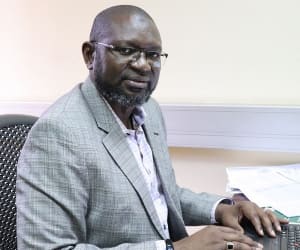
There is a huge discrepancy between the COVID-19 vaccine doses pledged to African countries and the number delivered, limiting the impact of donations on the continent, according to Ahmed Ogwell Ouma, deputy director at the Africa Centres for Disease Control and Prevention.

The continent, which is home to some 1.3 billion people, has received about 167.5 million doses of COVID-19 vaccines. Under 4% of the African population has been fully vaccinated — “a far cry from ... all the pledging and all the planning that had gone into a lot of the conversation late last year [and] particularly early this year,” Ouma said.
COVAX previously aimed to ship 620 million doses to African countries by the end of 2021, but vaccine export restrictions — such as those in India — manufacturing constraints, and delays in regulatory approvals of new COVD-19 vaccines have forced the global mechanism to scale back on its supply forecast for the year. This means Africa is set to receive only 470 million doses by the end of December — not enough to cover 40% of the continent’s population. Donations pledged by high-income countries have also been slow to materialize.
Undelivered pledges are “not useful” for the continent, Ouma said Monday during a virtual event held amid the United Nations General Assembly, titled “Avoiding Future Failures: How Should the World Prepare for the Next Pandemic?”
Coinciding with the 76th annual U.N. General Assembly, Devex will convene U.N. agency heads, government leaders, development practitioners, and private sector actors to discuss the most effective ways to build back better. Register here for our daily events.
“You pledge and deliver or not pledge at all. ... If you pledge, then there is an expectation on both sides, and someone else who may have wanted to step in and provide some guidance will not because a pledge has been made,” he said. “So pledges that are not delivered are not useful — certainly not for us.”
It’s unclear what exactly is holding up pledged donations. But some are likely still in line for production, and doses available in some countries are being reserved for booster shots. A lack of transparency around vaccine supply means no one one knows where doses are going.
If given the opportunity, African officials prefer to purchase their own vaccines for the continent rather than rely on donations, Ouma said, echoing a position held by a special envoy for the African Union.
“We just want to be ahead of the queue. We buy what we need and we come back and we vaccinate,” Ouma said.
All you need to know from UNGA 2021
To get on-the-ground coverage, in-depth analysis, and behind-the-scenes reporting from the 76th U.N. General Assembly, sign up for our special edition newsletters.
During the virtual event Monday, Dr. Mark Dybul, a member of the Independent Panel for Pandemic Preparedness and Response, reiterated the panel’s recent recommendation that high-income countries quickly redistribute at least 1 billion COVID-19 vaccines to the 92 low- and middle-income countries that are part of COVAX’s advance market commitment.
“There is enormous excess capacity even with some boosters … and that should be redistributed immediately,” said Dybul, who is also a professor in the department of medicine at Georgetown University Medical Center and co-director at the university’s Center for Global Health Practice and Impact.
However, these vaccines should be redistributed by regional bodies — such as Africa CDC — when possible, he added.
“You do need a central global mechanism because there'll be vaccines coming in from all over, whether purchased or donated. But they [this global mechanism] shouldn't be managing any more than … as a clearinghouse,” Dybul said.
“Why on earth would people in Geneva determine which countries [will receive vaccines] and how they're going to get them? ... What that's led to is vaccines showing up in countries literally with the country not knowing until they show up at the airport, sometimes with vaccines that expire in two weeks,” he added.








